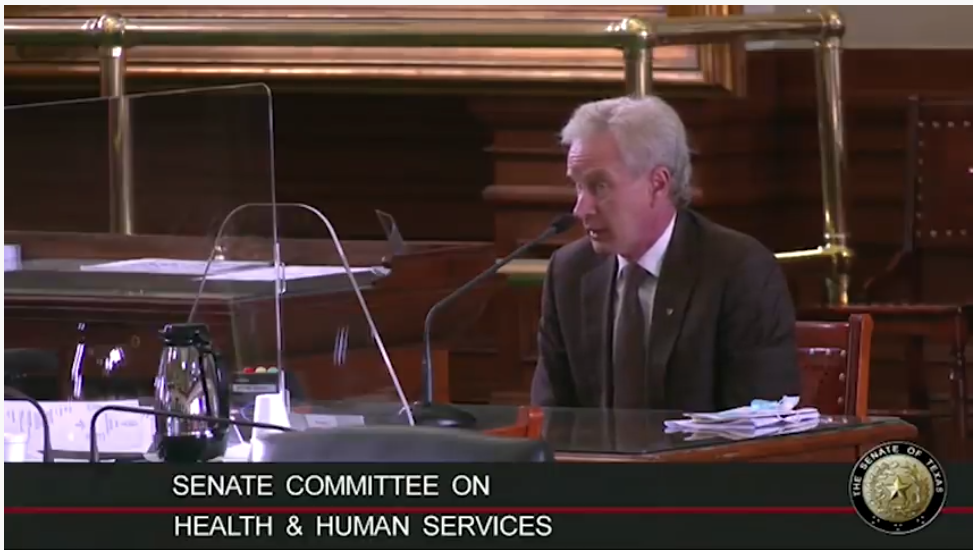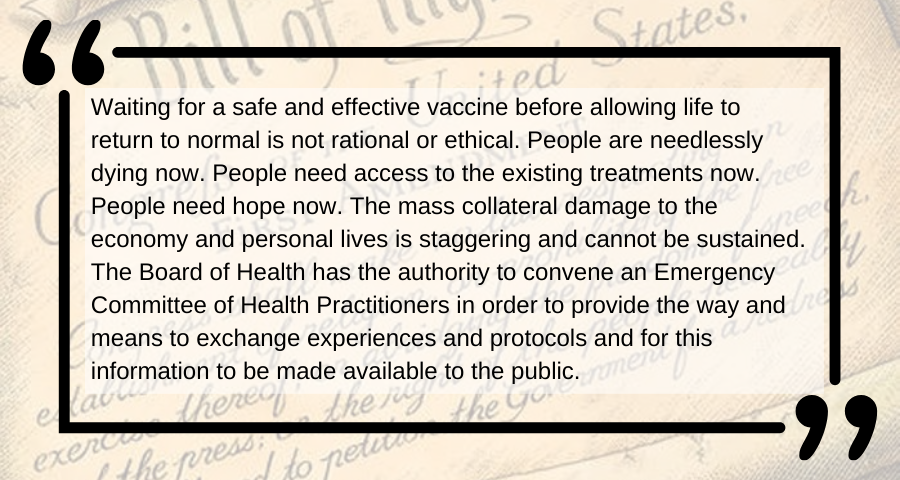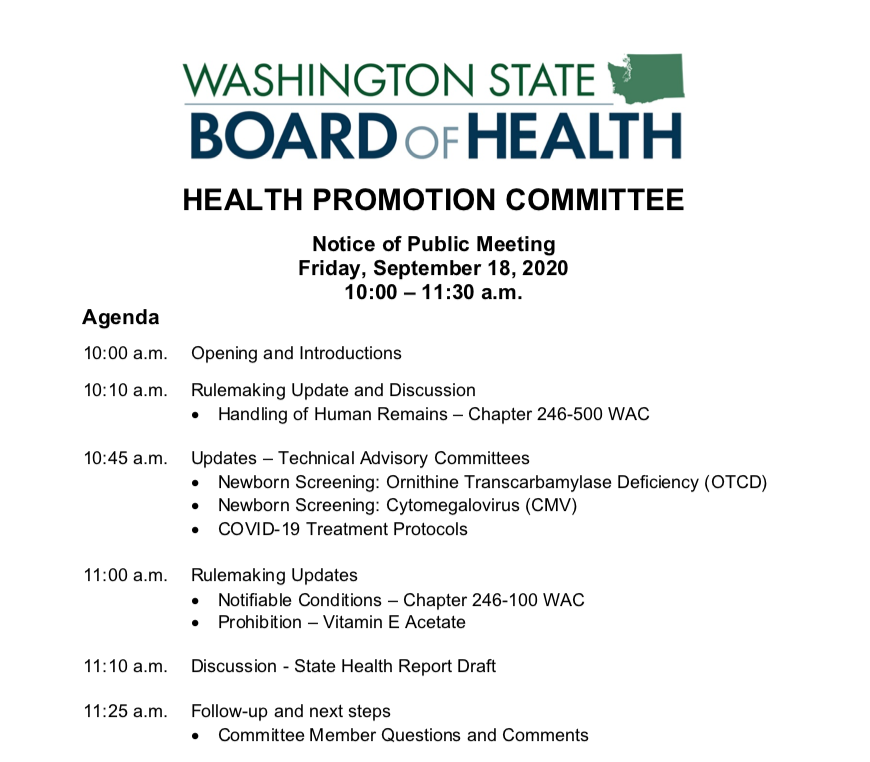Below you will find the dialogue between Informed Choice WA and the WA State Board of Health regarding our 2020 petition to convene a committee of knowledgeable health care practitioners in order for existing COVID-19 treatments to be learned discussed and the information shared with the medical community and the public to save lives and dispel fear. They refused.
We are now nearing the end of March, 2021, and still no action has been taken at the state or federal level to ensure everyone in this nation knows about existing treatments. On March 10, 2021, Peter McCullough, MD, internist and cardiologist, testified to the Texas Senate HHS Committee on this topic. He reveals that with early treatment, 85% of fatalities might have been prevented, and that the continued neglect of early treatment will lead to more unnecessary deaths.
The AAPS Guide to Home-Based COVID Treatment he mentions can be found HERE.
The FLCCC Alliance Treatment protocols can be found HERE.
A collection of most of the effective treatments can be found HERE.
For a transcript of the below video, please see this article by Jennifer Margulis.
❖ ❖ ❖
ICWA’S DIALOGUE WITH WA BOH/DOH/SECRETARY OF HEALTH REGARDING TREATMENTS
October 27, 2020: Response to the BOH’s formal letter denying our petition
October 23, 2020: BOH’s formal letter denying our petition
October 13, 2020: WA State Board of Health considered our Petition. See the video below.
We’re sorry to report the Board’s Decision: Decline
There was no discussion. Five of the 10 board members voiced their opinions, and the vote was taken. The Chair indicated he had struggled with our request since August, understanding the importance of such a committee yet not finding the duty to carry it out in the RCW’s. The Secretary of Health said he supported the idea of such a committee, and he “absolutely believe[s] that that’s something that has to happen”, but it was not “in his wheelhouse” or that of the BOH or DOH to do so, saying it was the responsibility of federal agencies, like the HHS.
We disagree. We believe the RCW’s clearly allow for the Secretary to take this unprecedented step that is neverthless well within the legal mandate of his position. We argue it is his duty to use data made available to him for the “Evaluation of outcomes of health care interventions to assess their benefit to the people of the state” RCW 43.70.050). He disagrees.
It was said that the state didn’t have the resources, the expertise, the time, or the money to organize such a committee — because they were too busy with COVID-19. Irony? Hundreds of millions are being spent in the state in response to Covid-19. Not a penny addressing ways to ensure all effective treatment protocols are known about.
It did not seem to occur to them that if they worked with us, if they created a safe space for marginalized effective treatments to be shared and made known, that their work in all other COVID-19 related areas would become unnecessary.
The meeting, including oral public comment, is available on TVW. The petition discussion begins at the 3:43:00 mark (I think this link should take you there): https://www.tvw.org/watch/?clientID=9375922947&eventID=2020101084&startStreamAt=13392&autoStartStream=true
We thank all who signed the petition and everyone who sent in written public comment (available here https://sboh.wa.gov/Meetings/MeetingInformation/2020/October13Online)
There is great value in our effort. We have grown stronger by the experience, and we understand better the major reforms that must take place in “Public Health.”
September 18, 2020: BOH sub-committee meeting
In the short sub-committee meeting, the staff repeated to the two Board members present what they’d written on August 26, that the Board has authority under RCW 43.20.050 to make recommendations to the Secretary of Health and has utilized technical advisory committees to do so. They said staff will present our request to convene a committee to the Board for consideration at their October 13 meeting.
So it seems our request for a speedier process is being denied, even though Secretary Wiesman had already entered into the conversation (see below). We do understand that these times are challenging for everyone, and ICWA appreciates the hard work performed by the staff at BOH, which often requires much research, analysis, and preparation for presentation. It was ironic, however, that patience was requested since Covid-19 was causing many challenges, when our request is intended to speed the return to normal by reducing fear and improving outcomes.
September 10, 2020: ICWA follow-up
Dear Secretary Wiesman and BOH staff:
It has been 9 days since I sent the below message and concerns. Every day that passes with people living under unnecessary fear and restrictions leads to more harm.When can I expect a response? It is my understanding that the Board of Health must formally respond to the petition in a public meeting.I understand that what we are asking of you is unprecedented. But so is every single action taken by the state in response to Covid-19. Extended restrictions and full-population mask-wearing are experiments upon the population, and they come with grave consequences to many.Dedicated and knowledgeable practitioners in our country and our state have found effective treatment protocols. We can save lives, we can end the fear and restrictions, if we work together in an unprecedented way to share the information.How can the state feel justified in issuing restrictions that are causing businesses to fail, driving many to despair and depression, and not do everything within its power to get information about existing, effective, inexpensive treatment protocols to all?We can do this. We, as a state, as members of the community, can find common ground in this crisis. We all want to save lives and to restore life back to normal. Let’s start working together now.I look forward to your immediate response.Sincerely,Bernadette Pajer
September 1: ICWA Response
Dear Secretary Wiesman:
If you hope to regain public trust, which is rapidly diminishing, I think it would be best for you to reconsider your role, and that of the DOH, in the formation of a committee of practitioners who are using inexpensive, effective, un-patentable treatments right now.
As more of the public learns that these treatments exist and the state is telling them otherwise, the loss of trust becomes increasingly irrevocable.
I am not in a position to request the medical community convene such a committee. As Secretary of Health, you are, and you have the resources, connections, authority, and I would argue, the duty to do so:
From RCW 43.70.040
In addition to any other powers granted the secretary, the secretary may:
(2) Appoint such advisory committees as may be necessary to carry out the provisions of chapter 9, Laws of 1989 1st ex. sess.
From RCW 43.70.050
Collection, use, and accessibility of health-related data.
(2) All state agencies which collect or have access to population-based, health-related data are directed to allow the secretary access to such data. This includes, but is not limited to, data on needed health services, facilities, and personnel; future health issues; emerging bioethical issues; health promotion; recommendations from state and national organizations and associations; and programmatic and statutory changes needed to address emerging health needs. Private entities, such as insurance companies, health maintenance organizations, and private purchasers are also encouraged to give the secretary access to such data in their possession.
(4) The secretary shall review any data collected, pursuant to this chapter, to:
(a) Identify high-priority health issues that require study or evaluation. Such issues may include, but are not limited to:
(i) Identification of variations of health practice which indicate a lack of consensus of appropriateness;
(ii) Evaluation of outcomes of health care interventions to assess their benefit to the people of the state;
(iii) Evaluation of specific population groups to identify needed changes in health practices and services;
(iv) Evaluation of the risks and benefits of various incentives aimed at individuals and providers for both preventing illnesses and improving health services;
(v) Identification and evaluation of bioethical issues affecting the people of the state; and
(vi) Other such objectives as may be appropriate;(5) Any data, research, or findings may also be made available to the general public, including health professions, health associations, the governor, professional boards and regulatory agencies and any person or group who has allowed the secretary access to data.
In April, Paul E. Marik, M.D., FCCM, FCCP, Endowed Professor of Medicine, Chief, Div. of Pulmonary & Critical Care Medicine, Eastern Virginia Medical School Norfolk, Virginia said of the MATH+ combination nutrient and drug protocol they had developed:
“People are dying needlessly from COVID-19. This protocol can save lives.”
Four months later, people are still dying needlessly, and because of regulatory, political, and industry-capture issues, the two organizations you suggested, NIH and the IDSA (funded in part by Remdesivir makers Gilead Sciences, Inc., Janssen Pharmaceutical, Pfizer Pharmaceutical, and ViiV Healthcare/GSK), are not recommending or promoting the existing solutions.
On August 18, Dr. Marik and four highly published critical care specialists from major academic medical centers published the protocol they have been using and evolving as needed: MATH+ protocol for the treatment of SARS-CoV-2 infection: the scientific rationale in the medical journal Expert Review of Anti-Infective Therapy, stating:
“We believe that it is no longer ethically acceptable to limit management to ‘supportive care’ alone, in the face of effective, safe, and inexpensive medications that can effectively treat this disease and thereby reduce the risk of complications and death.”
MATH+ represents just one effective treatment approach for which there is now published literature. Are there randomized control studies of these approaches? Not yet. Is it ethical to allow people to die needlessly when medical, functional, and naturopathic doctors have used their years of experience to develop treatments that work to save lives? No. These doctors are preventing severe disease and saving lives every day, and the public needs to know.
So far, WA State’s response has not included anything regarding treatments. As far as I have seen, the modeling and recommendations from The Institute for Disease Modeling (IDMOD.org) of the Bill & Melinda Gates Foundation’s Global Health Division which is focused on a vaccine solution that may never materialize, as well as the direction provided by McKinsey & Company, have never once included any information about known treatment protocols. They have suggested only extreme measures never before imposed on populations for such lengths of time: closing businesses and schools, social distancing, masking the entire population—even children. The measures have been exacting an enormous toll on the population; and for years to come, their harm is predicted to far exceed any possible benefit. This approach is not sustainable or repeatable or ethical.
In this and any future crisis, a system must exist to efficiently gather and disseminate the effective treatments developed by our frontline doctors in order to minimize harm to the public.
Waiting for a new drug or vaccine will never be the appropriate response. Treatments must always be sought without prejudice—nutrients, drug, oxygen, and other therapies must be given their due respect. What works, works. Profit and politics should not play a role.
In light of the fact that this is a public exchange, please reconsider your role, and that of the DOH, in the formation of a committee of practitioners who are using inexpensive, effective, un-patentable treatments right now to prevent serious disease and to save lives so that this information can be rapidly learned and disseminated.
I look forward to your response,
Sincerely,
Bernadette Pajer
ICWA Public Policy Director
August 31: Secretary Wiesman’s Response
Dear Ms. Pajer –
I hope you are doing well. After reviewing your correspondence with the Washington State Board of Health, I believe you will want to reach out to the University of Washington or other academic healthcare partners who have the needed expertise and may have capacity to convene such a committee. In addition, please be aware that the following two national groups, the National Institute of Health and the Infectious Disease Society of America, are reviewing literature and making treatment recommendations.
John Wiesman, DrPH, MPH
Gender Pronouns: He/Him/His
Secretary of Health
Washington State Department of Health
August 27: ICWA Response
Dear Kaitlyn and BOH Members,
I appreciate your examining WA law and determining you have the authority to make the recommendation to the Secretary of Health to convene a committee regarding COVID-19 treatment.
However, time is critical. Waiting six weeks, until October 13, to present our request to the Board is unacceptable. Action is needed now.
We are living under emergency conditions, our lives are completely disrupted, and people are suffering financially, emotionally, and psychologically.
If the state can take the unprecedented steps of shutting down businesses, locking down populations, issuing mask orders, closing schools, disrupting lives to such an extent that depression, suicide, and drug abuse are on the rise, and people are losing their businesses and their homes, the state can take the unprecedented step of convening a committee now. The committee would provide a means for the very best existing treatments to be discussed and shared, so that severe disease and deaths can be drastically reduced, providing hope to a public that has been made dangerously fearful, and allowing the severe restrictions to come to an end.
Treatments are needed now and they will be needed later, even if a vaccine is soon given Emergency Use Authorization or licensed by the FDA, which is looking increasingly unlikely. The FDA has said they will approve vaccines with 50% effectiveness, clinical trials are showing several candidates don’t prevent infection or transmission, only a reduction in some symptoms, and the safety signals in Phase I & II trials are very concerning. The safety concerns include well-studied “disease enhancement” and issues and risks posed by novel platforms such as those that use PEG-lipid nanoparticles, which Moderna literature reveals.
We cannot wait for a vaccine to save us. The state’s response must begin to include providing the ways and means for existing treatments to be learned about and utilized.
In the absence of an FDA approved “gold standard” COVID-19 treatment, knowledgeable doctors are not sitting by idly, letting their patients suffer. They are using their education, their experience, and on-the-shelf tried-and-true nutrients, drugs, and therapies, to prevent the development of severe disease and to reduce fatalities. These approaches must be discussed and shared and the public must be informed. In today’s regulatory climate, it is very difficult, if not impossible, for doctors to provide details to the public and even each other about treatment protocols they are finding effective. That is why I and the hundreds of individuals who signed the petition, are asking the Board of Health and Secretary of Health to convene a committee to provide the ways and means of this critically needed information exchange.
I have previously and repeatedly sent to the DOH and BOH information about several protocols. There is now a website ”HealthyImmunityNow.org” that lists many of them with links to published studies. More on-the-shelf drugs emerge nearly daily that are proving to help reduce severity of disease and reduce fatalities.
We are asking you to act now. If forming a committee is not the precise tool for the state to use, then what is? What state programs, commissions, AND/OR agencies have the ability to carry out this mission?
It is not morally acceptable for the state to continue to say there are no treatments that doctors and individuals can utilize to reduce disease severity and to reduce risk of death from COVID-19.
Please act now.
Sincerely,
Bernadette Pajer et al.
ICWA Public Policy Director
August 26: BOH Response
Ms. Pajer,
Thank you for message. We received your request and reviewed the documentation you provided. We understand your request is for the Board of Health and Department of Health to convene a committee regarding COVID-19 treatment, and not a request to adopt, amend, or repeal a rule under the Board’s authority. Therefore, we do not consider your request to be a petition for rulemaking under RCW 34.05.330.The Board does not have authority over health care provider scope of practice, including treatment of diseases, except in limited circumstances (e.g., the control and treatment of sexually transmitted diseases). These types of activities are regulated by health professional boards and commissions at the Department of Health. However, the Board has authority under RCW 43.20.050 to make recommendations to the Secretary of Health and has utilized technical advisory committees to do so. Staff will present your request to convene a committee to the Board for consideration at their October 13 meeting.
Please do not hesitate to reach out with any questions or concerns.
Respectfully,
KaitlynKaitlyn Donahoe, MPA (she/her)
Health Policy Advisor
Washington State Board of Health



